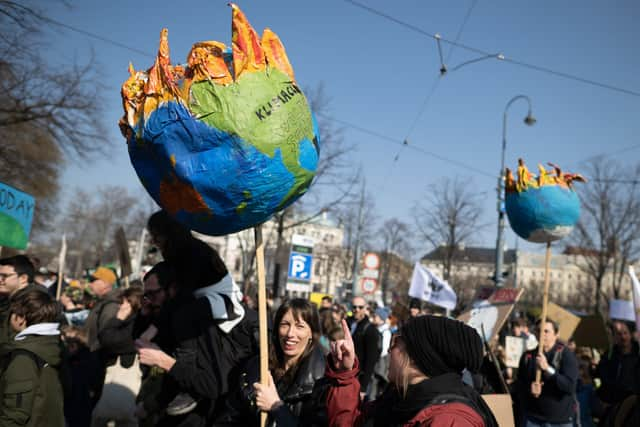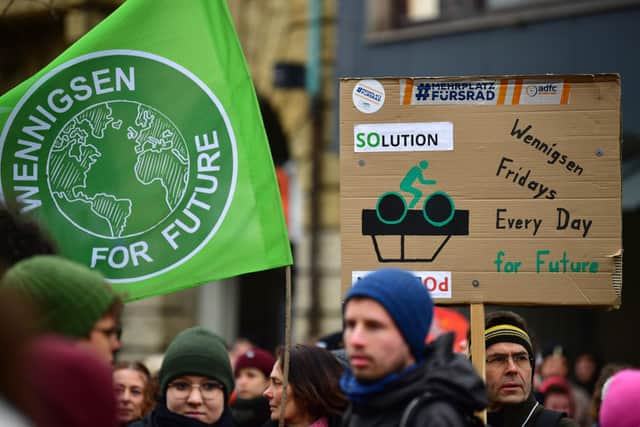Fridays for Future: why did climate activists across the globe skip school on Friday, what is fossil finance?
and live on Freeview channel 276
Young people across the world have skipped class on Friday in the latest of a series of global climate strikes, setting their sights this time around on fossil fuels.
Fridays for Future is a youth-led and organised movement that began in August 2018, after 15-year-old Greta Thunberg and other young activists sat in front of the Swedish parliament every schoolday for three weeks, to protest against the lack of action on climate change. Her posts on Instagram and Twitter soon went viral, and groups of young people across the world organised protests of their own.
Advertisement
Hide AdAdvertisement
Hide AdSstudents once again hit the streets on Friday (3 March), for Fridays For Future’s global climate strike. While each local group has their own causes - unique to them and the place they live - the overarching theme of the 3 March strike was ending fossil finance.
But who took part in the latest strikes, and what exactly is fossil finance?


What countries took part in the 3 March global climate strike?
While preliminary strike numbers with Fridays for Future are not yet in, thousands of people were involved in demonstrations in dozens of countries - including Europe and the United Kingdom.
In Scotland, young climate protesters stopped traffic as they marched through the centre of Edinburgh. Around 200 campaigners walked from the Meadows, down the Mound, along Princes Street and then down the Royal Mile to Holyrood on Friday.
Advertisement
Hide AdAdvertisement
Hide AdAs protesters chanted slogans such as “Hey hey, ho ho, fossil fuels have got to go”, passers-by stopped to take photographs and videos of them. A rally then took place outside Scottish Parliament, where speakers addressed the crowd.
Dylan Hamilton, 18, from Fridays For Future, said: “We are here because of greed, we are here because of our reliance on a finite source of energy. We are here because the richest want to get even richer.
“It did not have to be this way. The system was designed this way. The system was designed to extract and exploit the Earth’s resources,” he said. “Society’s reliance on fossil fuels is the cost-of-living crisis. To solve this we have to put people before profit. We have to stop burning fossil fuels.”
The protest was also attended by Friends of the Earth Scotland and activists campaigning to stop the Rosebank oil field being approved.


Advertisement
Hide AdAdvertisement
Hide AdEarlier, thousands of climate activists hit the streets in Berlin, Germany, to demand the government takes tougher action on global warming in the transportation sector, the Independent reports. The Free Democrats - which controls the country’s Ministry of Transport - has pushed back against efforts to phase out combustion engines and reducing road construction.
This has angered both its coalition partners - the Social Democrats and the Greens - and activists who say they are frustrated Germany is missing climate targets. Local transport unions, whose members are currently striking, also expressed their support for the climate strike.
Thousands also attended largescale protests in Australia and New Zealand, with the mayor of one major centre even saying he had changed his stance on climate change, after New Zealand’s recent devastation at the hands of Cyclone Gabrielle, local media reports.
What is fossil finance?
Fossil finance is when banks, insurers, and investment companies - usually in the global north - finance fossil fuel projects in Asia, Africa, the Middle East, and South America, sometimes contributing to environmental harm and human rights abuses, on top of the eventual carbon emissions the oil, gas, or coal would create.
Advertisement
Hide AdAdvertisement
Hide AdIn a statement, Fridays for Future said they were taking aim at fossil finance as the root cause of the climate crisis. “The money of the historically largest emitters of greenhouse gasses is funding the destruction of the planet by making fossil fuel extraction possible, which majorly impacts the most affected communities by the climate crisis.”
Many of those groups had been fighting against fossil fuel projects far longer than Fridays for Future has existed, a spokesperson said. “As a global climate justice movement, it is our responsibility to join their fight and amplify their voices and demands.”
One of Fridays for Future’s demands was “an end to the financing of all fossil fuel projects”. They also asked the world’s historically largest emitters - particularly in the global north - to unconditionally cancel the global south’s financial debt, and payreparations to communities most affected by the climate crisis.
“The International Energy Agency has been very clear: we must end fossil finance now to comply with the Paris Agreement and limit global warming to +1.5°C,” they said. “The IPCC has also reminded us that our window of opportunity to achieve this objective is closing very rapidly. Investing in fossil fuel projects not only is fully incompatible with the Paris Agreement and international law, but it is a criminal act with horrible consequences.”
Advertisement
Hide AdAdvertisement
Hide AdSome UK banks say they have already committed to change. A Santander spokesperson told NationalWorld they were, “fully committed to supporting the transition to net zero and have set emission reduction targets for 2030 across a range of material emitting sectors within our loan book.
“Our lending policies prohibit the financing of new upstream oil clients and projects, among other restrictions, and for the past ten years we have consistently been one of the largest providers of renewable energy project finance in the world.”
Comment Guidelines
National World encourages reader discussion on our stories. User feedback, insights and back-and-forth exchanges add a rich layer of context to reporting. Please review our Community Guidelines before commenting.
